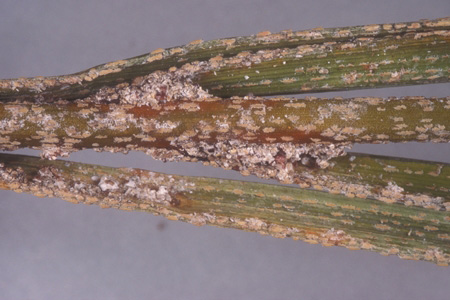Home » Bugs » Lawn Pests »
Active Seasons




Red Date Scales Appearance and Size Facts
Red date scales are a species native to the Middle East and North Africa that have made their way to Florida. These tiny insects embed themselves in a palm tree or plant’s leaves, stems, trunks, and fruit, making them unsightly and dangerous to plant populations. Here are a few key characteristics of red date scales:
- Reddish brown to deep red color
- Females are between 0.4 to 0.6 inches long; males are even smaller
- Round-shaped bodies with tiny or non-existent legs
- Often accompanied by a white wax coating
Distinguishing Red Date Scales From Other Lawn Pests
Out of all the lawn pests that may be in your Florida yard, distinguishing red date scales isn’t too complicated. Unlike coconut mealybugs, pink hibiscus mealybugs, or other waxy pests, red date scales have a characteristic reddish color and a distinct spherical shape. They also tend to cluster in the same areas of palm trees, such as the base of fronds near the trunk, leaf midribs, and fruit stalks. Other pests like aphids tend to scatter across plants in no particular pattern.
We provide red date scale treatment in the following locations and their surrounding areas:

Behavior and Habitat of Red Date Scales
Red date scales have specific behavioral patterns and habitat preferences that make them one of Florida’s more unique lawn pests. They’re mostly found on palm trees, particularly those within the Phoenix genus, but they can also infest Washington and Rattan palms. These pests prefer shaded areas with little sun or wind movement, allowing them to thrive and multiply. Unlike many other pests, red date scales don’t like to spread far; once they find a suitable spot, they embed themselves into the plant’s tissues and remain stationary.

Signs of Infestation of Red Date Scales
Keeping an eye out for a few key signs of red date scale infestation can help contain any issues you encounter. First, you may notice a reddish discoloration on your palm tree’s leaves, stems, trunk, or fruits. Over time, affected regions may wilt, yellow, and eventually die. Another telling sign is the presence of clusters of tiny, round scales, particularly at the base of fronds near the trunk, leaf midribs, or fruit stalks. You might also discover honeydew, a sweet, sticky substance excreted by these scales, which can attract ants and lead to mold.

Tips for Prevention of Red Date Scales
The best way to protect your plants from red date scales is to prevent them from appearing in the first place. Regularly monitoring your palm trees is crucial, as you should always watch for early signs of infestation, such as discoloration or clusters of tiny scales. You can also maintain the health of your plants by providing them with proper watering and care, as healthy plants are less vulnerable to pests. If you’re purchasing new plants, inspect them carefully for any signs of scales before introducing them to your garden.
Getting Rid of Red Date Scales
Figuring out how to eliminate red date scales can be quite a challenge. Doing so requires a comprehensive approach that includes removing affected parts of the plant, a thorough wash of impacted areas, and potential soap or oil applications. Your best bet is to invest in professional red date scale control services in Florida with Hulett Environmental Services, as expert pest control treatments will be much more effective than any DIY pest control methods you try yourself.
Effective Red Date Scale Control Solutions
If you discover an infestation of red date scales somewhere on your property, don’t panic. Just call Hulett! We offer various Florida lawn pest control services that treat red date scales and similar species. Our friendly service technicians are ready to fight against several different pests causing you trouble and help restore your peace of mind.
Explore our Florida pest control service areas to find a team of exterminators near you today! You can also check out our list of frequently asked questions for additional information. Once you’re ready, schedule your free inspection to get started!lted.

